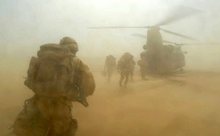 The support for Britain’s involvement in Afghanistan is, for the first time, showing major signs of fraying. Nick Clegg broke ranks with the other party leaders last week, and this weekend the total number of British deaths went beyond the number of soldiers killed in Iraq. Understandably, the Sunday papers are filled with stories about the lack of troops and kit. The Observer reports that an emergency review is taking place in the MoD to see if more soldiers need to be sent out.
The support for Britain’s involvement in Afghanistan is, for the first time, showing major signs of fraying. Nick Clegg broke ranks with the other party leaders last week, and this weekend the total number of British deaths went beyond the number of soldiers killed in Iraq. Understandably, the Sunday papers are filled with stories about the lack of troops and kit. The Observer reports that an emergency review is taking place in the MoD to see if more soldiers need to be sent out.
So what to make of it all?
First of all, it is clear that there were too few troops and civilians deployed to start off. I have given my take on what went wrong initially in Helmand to the Foreign Affairs Committee, as have some of the protagonists like Ed Butler. But though there are disagreements in our analysis, everyone agrees: 1) that the deployment was too small given what it was asked to do; 2) that it took the government’s civilian agencies far too long to get involved; and 3) that the US PRT, which had been based in Laskhar Gar for years before the UK arrived, had done very little to extend the writ of the international mission.
The blame for this lies in a number of places. It lies with Tony Blair, who did not appreciate the scale of the task at hand and overrode Cabinet concerns about the viability of the Helmand task. It lies with Gordon Brown and the Treasury, who for years starved the military so that they did not have the necessary resources until it was too late.
Labour’s 1998 defence review imagined the UK would, at any given time, be able to fight a “relatively short war” and one “enduring non-war-fighting operation”. Funding was set-up accordingly. This assumption has now been shown to be completely wrong. But some of the blame also lies with a number of senior Cabinet Office officials who ignored uncomfortable advice from departments suggesting the task would be hard and the ambition unrealistic.
That said, I am uncomfortable with the idea that just because senior generals want more troops they should have them. Generals give advice, ministers decide. That is the nature of a democracy. The government has to decide the spread of resources and balance competing demands. They have been wrong on this occasion, but not wrong in principle. General Douglas MacArthur also wanted more troops – to cross the Yalu River and fight the Chinese. President Truman, rightly, overruled him.
I also am worried about the focus, nay obsession, with Helmand Province. Even if the UK deploys another 2000 troops, I am gradually losing faith in our ability to conduct the required counter-insurgency mission. Better leave it to the US, who have the manpower and willingness to expose themselves to a far greater degree than even British troops, and focus any UK mini-surge on the areas further north and east; including around Kabul, where the insurgency is making in-roads and where NATO allies are struggling to hold the line.
Finally, I am worried that the Taliban’s Operation Foladi Jal – started in response to NATO’s recent moves – is a Viet Cong-style effort aimed at undermining support for the mission back in the UK, including by picking off soldiers through road-side bombings. They want us to be scared and demand a pull-back even though the damage they inflict has little military-strategic impact (even if the human toll is hard). Now, I am not saying we should not have a discussion about the war and its conduct. Of course we should. That is what democracies do. But we should also be clear that we are being manipulated by the enemy.






Comments